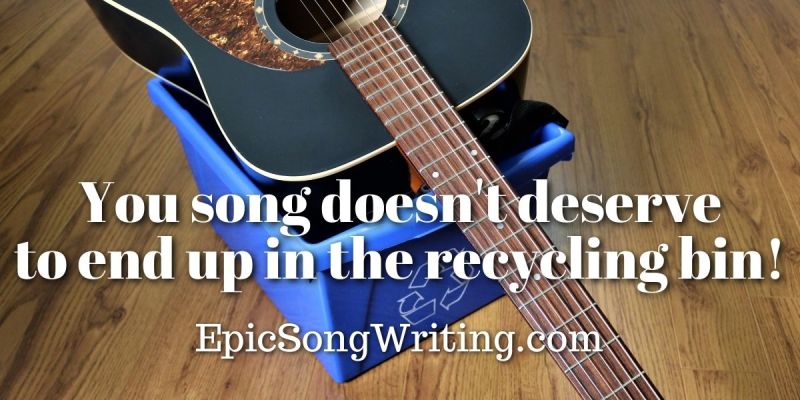Revive your song instead of trashing it… let your lyrics breathe!
You’ve been fighting with that song, wrestling with the lyrics until you’re ready to give up and drop it in trash….
If your song has any of these symptoms then there’s hope, keep reading!
- It’s hard to memorize (or harder than usual)
- It’s hard to sing the lyrics
- There are too many words
- You can’t explain what the song is about (in less than 2 sentences)
- It looks good on paper but it sounds weak when you sing it
- It started off great but you don’t like it anymore
- The lyric sheet is more than one typed page
You need to let your lyrics breathe!
You need to breathe while singing it…
So if there are too many syllables in the line, or there’s no time to breathe between phrases you have to carve out some more space so you can sing without running out of air.
Your audience needs to breathe too!
You have to leave space, rests in the lines of lyrics, for your audience to absorb your message…
For your audience to love your song, to remember your lyrics and be moved by the song, they need to understand your message the first time they hear it… if there’s too much going on, the story isn’t clear, or the lyrics are too hard to figure out… or you leave your audience out and you lose them.
First we’ll look into why you’re causing this problem to help you stop it, then we’ll move on to solving it so you can save your song!

You’re Creating Lyric Breathing Problems Because
1. You feel you have to fill up the whole song with lyrics. This is more common in singer/songwriter situations, where you’re working with just voice and instrument.
2. You have a disconnect between the written words and how you sing them… this is more common when you write lyrics before the music. This happens with:
- Too many syllables in a line,
- Writing lyrics in every bar of music,
- A lack of written transitions in the music, or
- No plan to include signature instrumental licks / phrases while writing.
3. You aren’t considering tension and release – a constant stream of lyrics creates tension or intensity if you don’t release it with rests (instrumental passages). It becomes monotonous, boring the audience and losing their attention. Too much of a good this is too much of a good thing!
4. You neglected to test your songs… your audience needs to connect with your song the first time they hear it. When you’re working on a song, you’re immersed in the world you are creating. Getting useful musical opinions from people you trust gives you a reality check… fresh ears can identify problems and challenge your assumptions, so you can find and fix problems without driving yourself crazy.

Finding Lyric Breathing Solutions
Listen to favourite songs, listen for the
- Pacing in the lyrics,
- Space (rests between lyrics) and
- Instrumental transitions connect between phrases and song sections
Learn new songs; Listen for
- Space between the lyrics
- Instrumental transitions, at the ends of lines and between song sections
- When and where to use signature licks
Listen to how the lyrics create tension/intensity and how it is released by instrumental passages.
During rests in the lyrics your audience has time to absorb and understand the meaning of your words. It takes a little time to decode and fully understand the lyrics, to figure out the words, understand your metaphors and mentally paint the picture you are singing. Short rests in the lyrics give your audience the chance to mentally interact with the ideas in your song.

Action Steps to Fix Your Breathing
- Improve your imagery, maximize your metaphors
- Parse your lyrics, remove unnecessary words or use phrases with fewer syllables
- Simplify your lyrics, use fewer words, use fewer syllables
- Simplify your vocabulary, use words that are easier to sing and easier to understand
- Play with the intensity of your music / lyrics, notice how the energy rises and falls within a section and throughout the song. It is common to have more syllables in a line of verse than a chorus, to build intensity (as well as tell a more detailed story)
- Trust yourself when you make a “mistake” singing your lyrics – sometimes you have just found a better lyric. I notice this most often in new songs… when I “accidentally” sing something better than I originally wrote down
- Repeat some lyrics, especially keywords or important phrases, repetition is a valid songwriting technique!
- Repeat a section, doubling a chorus is an easy one, add something to the arrangement to add interest to the second one
- Add instrumental transitions, between lines or especially between sections. Reuse part of a chord progression in your chorus to move to the next verse.
